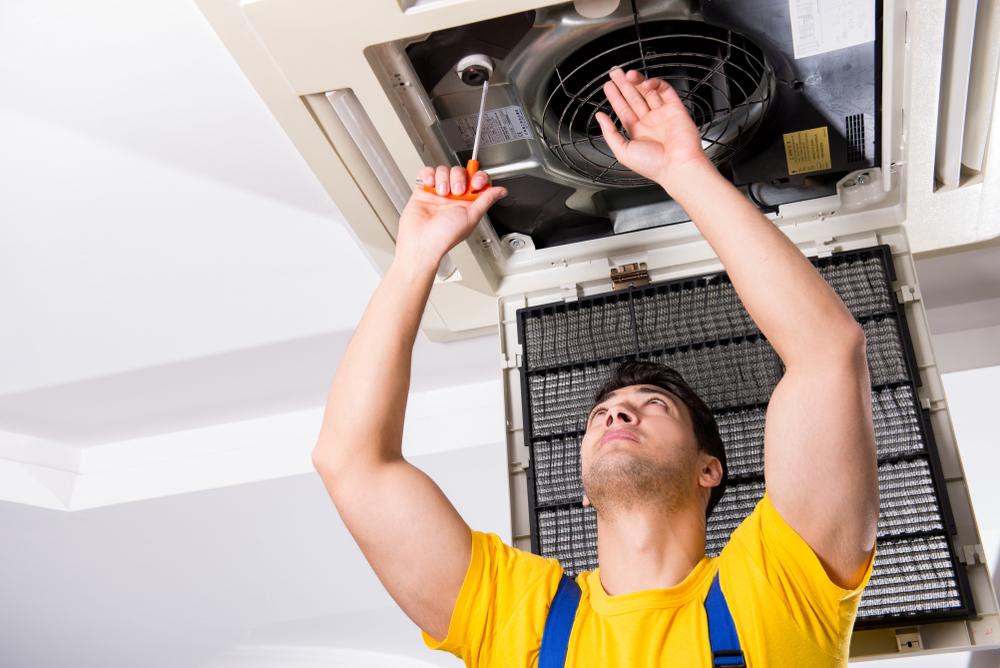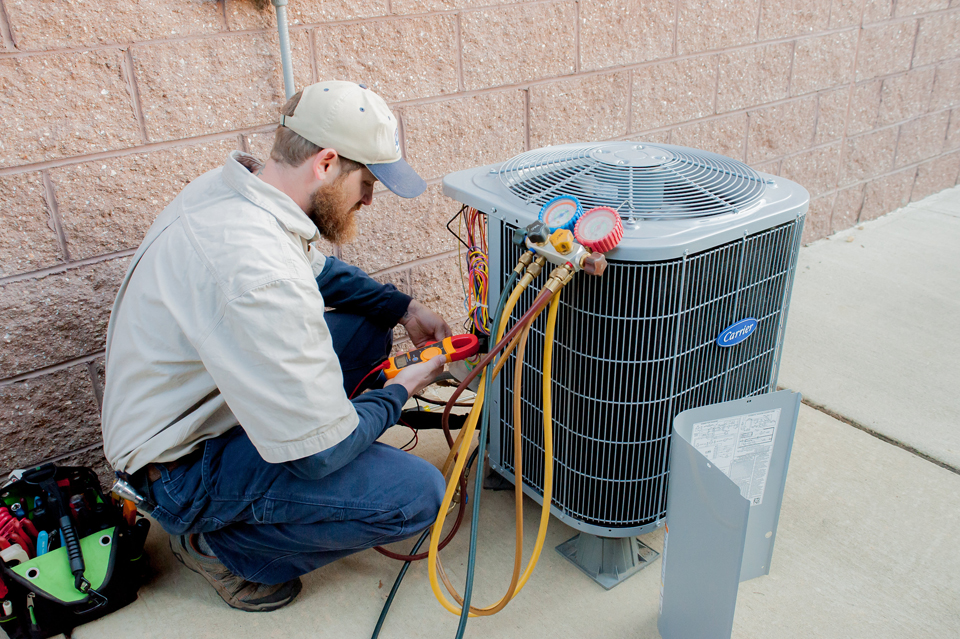Choosing Between a Warm Pump and Furnace: Trick Factors To Consider for Your A/c Requirements
When assessing home heating options for heating and cooling requires, the choice in between a warm pump and a furnace can be complex. Each system uses unique benefits tailored to particular climates and energy performance objectives. Understanding these differences is vital for making an enlightened choice. Key elements such as installment expenses and environmental impact better complicate the choice process. Which alternative genuinely straightens with one's comfort and sustainability preferences? The following areas will discover these factors to consider in information.
Understanding Heat Pumps: How They Function and Their Benefits
While many homeowners consider different heating options, comprehending how warmth pumps feature and their benefits can significantly affect their decision. Warmth pumps operate by transferring warm instead of generating it. In the wintertime, they extract warm from the outside air or ground and transfer it indoors, while in the summer, they reverse this process, cooling down the home by expelling heat outside. This twin performance makes them functional for year-round climate control.One of the primary benefits of heatpump is their energy efficiency. They utilize significantly much less electrical power contrasted to conventional furnace, potentially causing lower utility bills (heat pump service). Additionally, warm pumps have a smaller carbon footprint, making them an environmentally friendly selection. They also need less upkeep than standard systems, adding to long-term expense financial savings. In general, comprehending the technicians and advantages of warmth pumps can aid property owners make informed decisions concerning their home heating and cooling requirements
Checking Out Heating Systems: Kinds, Operation, and Advantages
Furnaces come in different kinds, consisting of gas, electrical, and oil designs, each with unique operational devices. Recognizing these distinctions is essential, as they impact efficiency and heating performance. Additionally, furnaces supply numerous benefits, such as regular warm output and dependability in cooler environments.
Sorts of Furnaces
Furnace can differ substantially in style and procedure, with heaters being a prominent selection amongst property owners. There are a number of sorts of furnaces, each utilizing various fuel resources and innovations. Gas furnaces are usual, leveraging gas to create heat successfully. Electric heating systems, on the other hand, make use of electric resistance to produce heat, usually favored for their uncomplicated installation. Oil heating systems, while less typical, are efficient in areas with limited gas accessibility (ductless mini splits). In addition, condensing furnaces make the most of power performance by catching and recycling exhaust gases. Each type runs via a system of heat exchangers and ductwork to disperse cozy air throughout a home. Comprehending the distinctions in between these heating system kinds is crucial for educated heating and cooling decisions
Advantages of Heating systems
For homeowners looking for dependable warmth during cool months, the advantages of heating systems are substantial. Heaters provide constant heating, ensuring even temperatures throughout the home. They are especially efficient in severe cool, frequently outshining warmth pumps in frigid conditions. Different types, consisting of gas, electrical, and oil furnaces, provide versatility to meet diverse needs and preferences.Furnaces likewise tend to have reduced preliminary installment costs contrasted to warm pumps, making them a more obtainable alternative for lots of. Their robust layout adds to a longer life expectancy, with many systems lasting over 15 years with proper upkeep. Furthermore, modern heating systems are often geared up with sophisticated modern technology for boosted effectiveness, which can result in minimized power costs. Generally, heating systems remain a dependable choice for reliable home heating.

Energy Performance: Contrasting Warm Pumps and Furnaces
When comparing power efficiency in between heatpump and heaters, the Seasonal Energy Performance Ratio (SEER) plays an important duty in identifying efficiency. In addition, a functional cost analysis exposes the lasting financial implications of each system. Recognizing these factors can assist homeowners in making notified decisions about their heating services.
Seasonal Energy Effectiveness Proportion
Power performance plays an essential role in the decision-making process between warm pumps and heaters, particularly when considering the Seasonal Energy Performance Ratio (SEER) This metric actions the cooling performance of warmth pumps over an entire air conditioning season, offering a standard way to examine efficiency. Greater SEER rankings show higher power efficiency, converting to reduced energy consumption and decreased utility expenses. On the other hand, furnaces are normally examined utilizing the Annual Gas Use Effectiveness (AFUE) score, which shows heating effectiveness. When contrasting these two systems, home owners ought to focus on SEER rankings for heat pumps, as they straight impact overall energy cost savings and environmental sustainability. A detailed understanding of SEER can especially influence the lasting fulfillment and cost-effectiveness of the picked HVAC option.
Functional Expense Analysis
Comprehending the functional prices connected with heatpump and heaters is essential for house owners examining their options. Warmth pumps typically offer greater energy efficiency, transforming electrical power into warm with minimal waste. This causes lower regular monthly energy expenses, specifically in moderate environments. On the other hand, traditional heaters, especially gas models, might have useful site lower upfront costs however can sustain higher functional expenditures over time as a result of fuel costs and effectiveness ratings.Moreover, heatpump can work as both heating and cooling systems, possibly lowering the requirement for different cooling and heating devices. While preliminary financial investments for heatpump might be greater, their long-lasting cost savings in energy effectiveness can make them a much more economical option for several homes. Cautious evaluation of neighborhood power rates is crucial to determine the most effective choice.
Setup Expenses: What to Anticipate for each and every Heating System
Installation expenses for home heating systems can differ considerably between heat pumps and heaters, affecting homeowners' choices. Heatpump typically have higher in advance installment prices, commonly varying from $3,500 to $8,000, depending upon the device size and complexity of installation. This includes the outdoor unit, indoor handling system, and necessary ductwork adjustments. On the other hand, heating systems have a tendency to have reduced first costs, balancing in between $2,500 and $6,000, which can be appealing for budget-conscious property owners. Nonetheless, installment costs can boost if considerable ductwork is required.Moreover, the selection of fuel type for heating systems-- all-natural gas, lp, or electric-- can additionally influence setup costs. While warmth pumps provide energy performance, their preliminary financial investment might discourage some buyers. Ultimately, reviewing setup costs along with long-lasting financial savings and effectiveness will certainly help property owners in making educated decisions about their heater.
Environment Considerations: Which System Performs Better in Your Area
Just how do climate problems influence the effectiveness of heating systems? The performance of warm pumps and heaters can vary substantially relying on the local climate. In modest environments, heatpump excel by successfully transferring warm from the outside air, making them an energy-saving alternative. Their performance decreases in extremely chilly temperatures, where they might have a hard time to draw out sufficient warmth. Conversely, furnaces, particularly gas models, offer reliable and consistent warmth no matter of outdoor conditions, making them more effective in colder regions.In areas that experience milder winters months, warm pumps can run efficiently year-round, providing both heating & cooling. On the other hand, areas with severe winters months typically profit from the effectiveness of furnaces. Ultimately, understanding the local climate is essential when choosing between a heatpump and a heater, as it straight impacts their functional effectiveness and overall efficiency.
Upkeep Requirements: Long-Term Take Care Of Warm Pumps vs. Furnaces
While both heatpump and heaters require normal maintenance to guarantee peak efficiency, their certain requirements and care routines vary significantly. Furnaces usually need less frequent interest, with annual examinations sufficing to examine for gas leaks, clean filters, and assess general functionality. Their easier design commonly enables for uncomplicated repairs.In contrast, heatpump necessitate semiannual upkeep due to their twin role in cooling and heating. This includes cleansing coils, checking refrigerant degrees, and guaranteeing that both the interior and outdoor devices operate at their best. Furthermore, warm pump maintenance typically includes more intricate components, making expert maintenance essential.Neglecting upkeep can lead to reduced performance and enhanced energy expenses for both systems. Inevitably, property owners need to consider these long-lasting treatment needs when choosing between a heatpump and a heater, as aggressive upkeep can expand the life expectancy and performance of either system significantly.
Environmental Impact: Selecting a Sustainable Heating Choice
The ecological influence of furnace is a vital analysis for home owners looking for sustainable choices. Heatpump are usually extra energy-efficient than standard heating systems, as they transfer heat as opposed to generate it, substantially reducing carbon exhausts. By making use of eco-friendly power sources, such as air-source or geothermal heat pumps, home owners can better minimize their environmental footprint.On the other hand, gas furnaces emit greenhouse gases and add to air pollution, though they often supply higher warm result. Nonetheless, advancements in technology have actually resulted in the growth of high-efficiency furnaces that minimize emissions.Ultimately, choosing a heater includes evaluating efficiency versus ecological influence. Property owners are motivated to show on local power sources and incentives for renewable systems, guaranteeing an option that aligns with both individual convenience and ecological obligation. The decision affects not only prompt comfort but additionally long-lasting sustainability and environmental health.
Frequently Asked Questions
How Much Time Do Heat Pumps and Furnaces Usually Last?
The life-span of heat pumps commonly ranges from 15 to twenty years, while heating systems can last in between 15 to three decades. Routine upkeep substantially impacts their longevity and performance in supplying heating options.
Can I Use a Heatpump in Very Cold Climates?
Heat pumps can operate in extremely cold climates, however their performance reduces as temperature levels decline. In such conditions, extra home heating resources might be required to click here to read preserve comfortable interior temperatures and ensure peak performance.

What Is the Noise Level of Warmth Pumps Versus Furnaces?
The sound degrees of warm pumps and heating systems differ considerably. Usually, heatpump run even more silently than traditional heating systems, making them more effective for those delicate to appear, while heaters may produce louder operational noises during home heating cycles.
Are Heat Pumps Suitable for Both Heating & Cooling?
Heatpump are without a doubt appropriate for both heating & cooling (ductless mini splits). They work by transferring warmth, giving efficient temperature level have a peek here control year-round, making them a flexible choice for home owners looking for an all-in-one cooling and heating service
What Dimension Heating Unit Do I Required for My Home?
Identifying the suitable size heater for a home requires examining variables such as square video, insulation quality, neighborhood climate, and the home's design. Consulting a professional can guarantee an exact analysis and optimal comfort. Warm pumps typically supply higher power effectiveness, transforming electrical energy right into heat with minimal waste. In modest environments, warmth pumps stand out by successfully transferring warm from the outdoors air, making them an energy-saving option. Alternatively, heaters, especially gas designs, give trusted and regular warmth no matter of outdoor problems, making them more suitable in cooler regions.In areas that experience milder winters months, warmth pumps can run effectively year-round, supplying both home heating and air conditioning. Warmth pumps are typically a lot more energy-efficient than conventional furnaces, as they move warm instead than create it, greatly reducing carbon emissions. By utilizing eco-friendly power resources, such as geothermal or air-source warm pumps, house owners can better lessen their eco-friendly footprint.On the various other hand, all-natural gas furnaces send out greenhouse gases and contribute to air contamination, though they frequently offer greater warmth outcome.